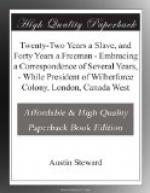We convened at the specified time, and organized by appointing Rev. R. Allen, president, A. Steward, vice-president, and J.C. Morrell, secretary. The convention which continued in session three days, was largely attended by all classes of people, and many interesting subjects were ably discussed; but the most prominent object was the elevation of our race. Resolutions were passed calculated to encourage our brethren to take some action on the subjects of education and mechanism. Agricultural pursuits were also recommended;—and here allow me to give my opinion in favor of the latter, as a means of sustenance and real happiness.
I knew many colored farmers, all of whom are well respected in the neighborhood of their residence. I wish I could count them by hundreds; but our people mostly flock to cities where they allow themselves to be made “hewers of wood and drawers of water;” barbers and waiters,—when, if they would but retire to the country and purchase a piece of land, cultivate and improve it, they would be far richer and happier than they can be in the crowded city. It is a mistaken idea that there is more prejudice against color in the country. True, it exists everywhere, but I regard it less potent in the country, where a farmer can live less dependant on his oppressors. The sun will shine, the rains descend, and the earth bring forth her increase, just as readily for the colored agriculturist as for his pale face neighbor. Yes, and our common mother Earth will, when life is ended, as readily open her bosom to receive your remains in a last embrace, as that of the haughty scorner of our rights.
In the city, however, there is no escape from the crushing weight of prejudice, to ramble over fields of your own cultivation; to forget your sorrows in the refreshing air that waves the loaded branches of an orchard of your own planting; nor to solace yourself with a gambol over the green meadow with your little ones. It is all toil, toil, with a burthened heart until shadows fall across the hearth-stone, and dismal forebodings darken the fireside, from whence the weary wife retires to refresh herself in broken slumber for the renewed toil of another day. Will not my friends think of these and many other advantages in favor of a country life, and practice accordingly?
After the close of the convention, I returned to my business in Rochester.
Until the discussion, which commenced about this time on the subject of temperance, I had been engaged, as most other grocers were at that time, in the sale of spirituous liquors somewhat extensively. My attention had never before been called especially to the subject, though I had witnessed some of its direst evils; but now, when I saw the matter in its true light, I resolved to give it up. I was doing well and making handsome profits on the sale of alcoholic beverages. I had also experienced a good deal of trouble with it. My license allowed me to sell




